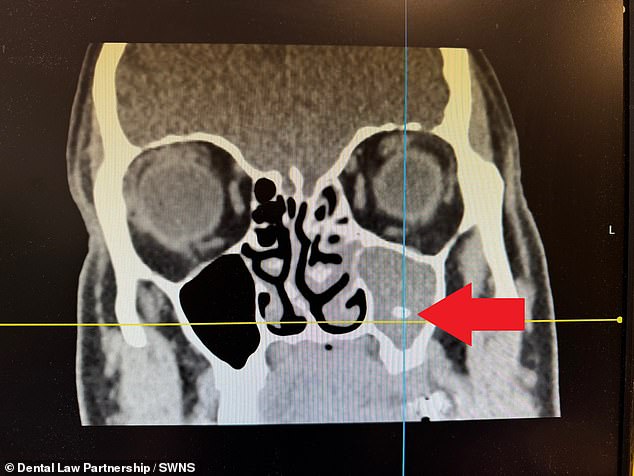A carer struggled to breathe for two years after part of his tooth became trapped in his sinuses following a botched tooth extraction.
Mark Shire suffered from chronic sinusitis which prevented him from sleeping and working due to constant pain and a stuffy nose made it difficult for him to breathe.
The 58-year-old from Marlborough, Wiltshire, originally visited the dentist in January 2020 to remove two teeth in the upper left part of his mouth that were causing him pain.
But after the extractions I still felt pain and the gum did not heal.
Finally, after two years of suffering, a scan revealed part of one of the extracted teeth located in his sinuses, he removed it and decided to take legal action.
A CT scan revealed he had left-sided sinusitis caused by a piece of tooth pushed into his sinus.

Mark Shire, 58, suffered from chronic sinusitis which prevented him from sleeping and working due to constant pain and nasal congestion made it difficult to breathe.
“I knew things weren’t going well because my dentist had a hard time getting my teeth out,” Mr Shire said.
‘The whole experience was very scary. “I’m very lucky that they finally caught it and I never thought it would all be due to a tooth extraction,” he added.
After the initial extraction, Mr. Shire instantly felt pain and was informed that his gum was not healing well.
A year later, he returned to the same dental office in pain and was prescribed antibiotics and had his tooth socket cleaned by his dentist.
For two years, Mr Shire suffered from sinus problems, including terrible headaches, nasal congestion and a bad taste in his mouth.
He said: ‘In January 2022, I visited a doctor’s office for pain and sinus congestion as I never thought it would be related to my teeth.
‘I was given antibiotics and nasal sprays but the problems continued.
“Then I was seen by a specialist from the ear, nose and throat department.
“Despite several courses of antibiotics, I was experiencing thick, smelly green mucus coming from the left side of my nose and throat, facial pain on the left side, and headaches on the left side.”
Sinusitis is usually caused by an infection and in most cases goes away on its own in about four weeks, according to the NHS.
However, some medications may help if the infection takes a long time to clear.
It is common after a cold or flu and can cause pain around the cheeks, eyes and forehead, stuffy and runny nose, headache and toothache, the NHS says.
In June 2022, Shire was referred to hospital, where a CT scan revealed that he had left-sided sinusitis caused by a piece of tooth inserted into his sinus.
“The sinusitis made me feel like I had a permanent cold,” he said.
‘My blocked nose made it difficult to breathe and I always had a horrible taste in my mouth because of the pus it drained.
‘I often had trouble sleeping and sometimes I couldn’t go to work because the headaches were so intense.
‘The whole experience was very scary. “I’m very lucky that they finally discovered it and I never thought it would all be due to a tooth extraction.”
After his ordeal, Mr Shire returned to his dentist in November of that year to tell him what had happened as a result of his treatment.
But he claims an x-ray was taken, but he received no apology for the botched extraction.
In May last year, he underwent surgery under general anesthesia where surgeons removed the remaining tooth fragment in his sinus.
“I had to take two weeks off work to recover. After that, my sinus problems disappeared and healed,” explained Mr. Shire.
Mr Shire decided to take legal action and was paid £8,400, but the dentist involved did not admit liability.
Further analysis by the Dental Law Partnership found that the tooth extractions caused a tooth fragment to fracture and be pushed into the sinus.
Nor did he find that any attempt was made to locate or remove it or to refer it to Mr Shire for remediation.
Heather Owen, of Dental Law Partnership, said: ‘The distress and pain our client has experienced was completely unnecessary.
“If the dentist involved had provided more satisfactory treatment, his problems could have been avoided.”


